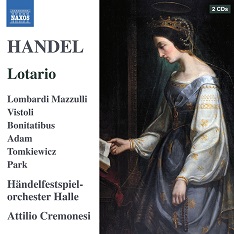Georg Friedrich Händels Oper Lotario wurde 1729 in London uraufgeführt. Die Handlung ist kompliziert und fußt auf Ereignissen aus dem Leben von Adelaide von Italien, Kaiserin des Heiligen Römischen Reiches.
Berengario, Herzog von Spoleto, der den Ehemann von Adelaide vergiften ließ, will diese mit seinem Sohn Idelberto verheiraten, der in sie verliebt ist. Aber Adelaide kann sich eine Verbindung mit dem Sohn ihres ärgsten Feindes nicht vorstellen.
Lotario, der König von Germanien, führt eine Armee an und marschiert nach Pavia, um Adelaide, in die er verliebt ist, zu schützen. In der Zwischenzeit hat Berengario Pavia erobert und lässt Adelaide einsperren.
Berengario verliert Pavia und wird von Lotario gefangen genommen. Die immer noch gefangene Adelaide muss sich zwischen der Krone und dem Tod entscheiden. Sie entscheidet sich für das Gift. Idelberto hält sie in letzter Sekunde davon ab, die Tat zu begehen, aber sie sagt ihm, dass sie ihn nie lieben werde. Idelberto akzeptiert dies und verspricht Adelaide Respekt und Treue, sehr zum Ärger seiner intrigierenden Mutter Matilde. Doch Lotario dringt in die Burg ein und befreit Adelaide. Das Schicksal von Berengario und Matilde liegt in den Händen Adelaides, die ihnen vergibt.
Kurz gesagt: Die Figuren dieser Oper singen von großen Gefühlen, von Liebe, Hass, Triumph, Verzweiflung.
Diese Live-Aufnahme wird vom Händelfestspielorchester Halle auf historischen Instrumenten gespielt und vom Dirigenten Attilio Cremonesi durchgehend recht entspannt dirigiert. Cremonesi geht es nicht darum, die Musik dramatisch zu schärfen, weil sie tatsächlich die Leidenschaftlichkeit der Handlung in relativ ruhigen Bahnen hält und trotz aller Kämpfe gar nicht kriegerisch daherkommt.
Die Besetzung ist vorzüglich mit der Sopranistin Francesca Lombardi Mazzulli als einfühlsam singende Adelaide. Der Tenor Krystian Adam singt die Rolle des Berengario mit gepflegter Tongebung, immer lyrisch und ausdrucksvoll.
Anna Bonitatibus singt die Matilde charakterstark und mit fein geführter Stimme. Countertenor Carlo Vistoli singt einen sehr verliebten Lotario, und auch Countertenor Rafał Tomkiewicz kann als Idelberto überzeugen.
Und so präsentiert sich diese Interpretation des Lotario als überaus gefühlvoll, und die Sorgfalt, welche Dirigent und Sänger den Melodien Händels zukommen lassen, zeigt die Qualität der Komposition.
George Frideric Handel’s opera Lotario was first performed in London in 1729. The plot is complicated and is based on events from the life of Adelaide of Italy, Empress of the Holy Roman Empire.
Berengario, Duke of Spoleto, who had Adelaide’s husband poisoned, wants to marry her off to his son Idelberto, who is in love with her. But Adelaide cannot imagine a union with the son of her worst enemy.
Lotario, the King of Germania, leads an army and marches to Pavia to protect Adelaide, with whom he is in love. In the meantime, Berengario has conquered Pavia and has Adelaide imprisoned.
Berengario loses Pavia and is captured by Lotario. Adelaide, still a prisoner, has to choose between the crown and death. She chooses the poison. Idelberto stops her from committing the deed at the last second, but she tells him that she will never love him. Idelberto accepts this and promises Adelaide respect and fidelity, much to the annoyance of his scheming mother Matilde. But Lotario breaks into the castle and frees Adelaide. The fate of Berengario and Matilde lies in the hands of Adelaide, who forgives them.
In short, the characters in this opera sing of great emotions, of love, hate, triumph and despair.
This live recording is played by the Halle Handel Festival Orchestra on period instruments and conducted by Attilio Cremonesi in a very relaxed manner throughout. Cremonesi is not interested in dramatically heightening the music, because it actually keeps the passion of the action in relatively calm channels and, despite all the battles, does not come across as warlike at all.
The cast is excellent with the soprano Francesca Lombardi Mazzulli as the sensitive Adelaide. Tenor Krystian Adam sings the role of Berengario with a cultivated tone, always lyrical and expressive.
Anna Bonitatibus sings Matilde with a strong character and a finely controlled voice. Countertenor Carlo Vistoli sings a very amorous Lotario, and countertenor Rafał Tomkiewicz is also convincing as Idelberto.
And so this interpretation of Lotario presents itself as extremely emotional, and the care that conductor and singers give to Handel’s melodies shows the quality of the composition.




















